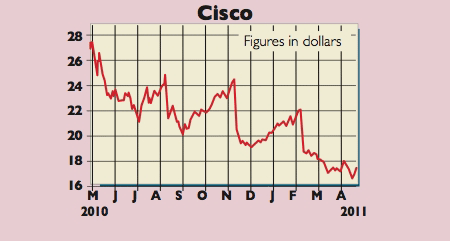
Last week both Apple and microchip giant Intel smashed Wall Street earnings estimates, due to booming sales of data-hungry devices such as iPads and laptops. The popularity of these products will heap more strain on already over-loaded telecoms networks. Indeed, mobile data traffic is expected to grow 26-fold between 2010 and 2015, equivalent to an annual growth rate of 92%.
That should be good for networking titan Cisco. It sells more than half of all optical routers and 70% of switches globally. And despite the recession, turnover has risen by an average 8.8% a year since 2006, hitting $40bn for the year ending July 2010. Two-thirds is derived from business or government customers, with the rest from telephone operators (such as AT&T). One of Cisco’s core strengths is that it is a one-stop shop, allowing customers to pick from a smorgasbord of internet solutions and assemble them into one inter-connected platform.
So why have the shares tanked by 40% over the past year? The group has been a victim of its own ambitious goals. It diversified into several unrelated areas, such as consumer devices, which distracted management and led to a fall in profit margins. The good news is that CEO John Chambers is fixing this – its ailing Flip video-camera unit got the chop earlier this month. And elsewhere, prospects are much brighter.
For one Cisco’s huge installed base of customers provides a rich seam of recurring sales and cross-selling opportunities. It has focused on video-conferencing, where its Telepresence system uses 3D surround-sound and life-size images to recreate the feeling of meetings without any of the problems of jerky pictures and poor audio quality. This helps customers to slash their travel costs and their carbon footprints.
Cisco (Nasdaq:Cisco) rated a BUY by Juda Group
The balance sheet is rock-solid too – net cash of $25bn offers plenty of ammunition for strategic acquisitions and stock buybacks. Wall Street expects current-year turnover and underlying earnings per share (EPS) of $43.78bn and $1.59 respectively, rising to $48.5bn and $1.76 in 2011/2012. That puts the firm on p/e ratios of less than 11. I’d rate the stock on a multiple of ten times the 2011 operating profit. After adjusting for the cash mountain, that generates an intrinsic worth of $24 a share.
Cisco is exposed to the usual concerns of price deflation, tighter IT budgets, foreign currency shifts and component supply issues. But one risk is over-stated: the fear of being swamped by Chinese rival, Huawei. Sure, Huawei is a threat, but many Western nations continue to be concerned about buying kit from China after several high-profile cyber attacks. All told with internet traffic going through the roof, together with the emergence of 4G technologies, Cisco is a good play on the future growth in optical networking. The Juda Group has a price target of $26, and the next quarterly results are due out on 11th May.
Recommendation: BUY at $17